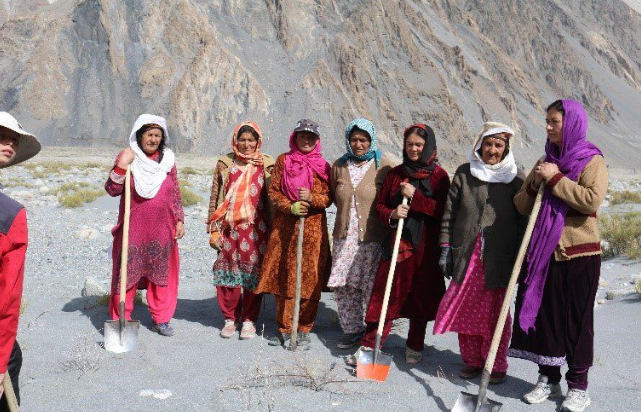By Asad Cheema
ISLAMABAD: International Centre for Integrated Mountain Development (ICIMOD), Country Focal Person for Pakistan and Team Lead, Integrated River Basin Management, Faisal Mueen Qamer on Monday said the Adaptation Fund’s $10 million climate financing approval for the Centre’s nature-based initiative would help restore Indus River facing worst climate change impacts.
The funding has been approved at a critical juncture when the World Meteorological Organization has reported 2023 as the driest years for global rivers in three decades which was worrying for the Indus River which was one of the largest rivers in the world and sustained 90 percent of Pakistan’s population and drove three quarters of its economy, the ICIMOD focal person said.
“Climate Change is already affecting the water availability in the Indus Basin and this threatens progress, poverty reduction and inclusive development that’s why ICIMOD is closely working for past 12 months with the Ministry of Climate Change and Environmental Coordination, UN Women, and UNICEF to structure this proposal,” he said.
Faisal Mueen underlined that the project for the Indus: Sustainable Actions for Ecosystems Restoration in Pakistan (SAFER) worth $10 million would reduce Pakistan’s vulnerability to climate-driven impacts.
He added that the Centre’s goal was to reduce vulnerability of those most at risk especially women, children and youth, the groups that have been worst affected during the 2022 floods.
The ICIMOD’s keen interest, he said was mainly due to three reasons mainly this project builds on decades of infrastructure investments in the Indus Basin with a fresh nature-based approach that will be focussing on springs, groundwater recharge as well as ecosystem based wetlands and waste water treatment that perfectly aligns with the Living Indus Initiative ensuring ICIMOD’s expertise contribute to its national level effort lead by the MoCC.
Thirdly, he said it was a unique partnership while ICIMOD brings scientific expertise would be working closely with UNICEF and UN Women for the first time. The partner organisations’ deep connection with the communities, and track record in water sanitation and health makes them valuable partners in delivering sustainable solutions, he said, adding, “This approval is a big step forward for adaptation finance we know from our major report, Water, Ice, Society, Ecosystem in the Hindu Kush Himalaya that the region is at the frontline of climate shocks.
We urgently need to scale up finance to support the communities that are already hitting their limits to adaptation.”
Adaptation Fund, he said is one of the world’s key mechanism for climate finance. “We are proud to navigate the process successfully to ensure that the funding reaches the communities that need it most,” he added.
SAFER, led by the Ministry of Climate Change and Environmental Coordination (MOCCEC), with International Centre for Integrated Mountain Development (ICIMOD) serving as regional implementing entity, will see the roll-out of key, inclusive approaches to increase integrated and adaptive water resource management in the Indus River, with a particular focus on nature-based solutions (NbS) and interventions that benefit and/or are designed to increase the participation of women, youth, and children.
SAFER aims to mitigate the risk of such climate shocks, leveraging the expertise of executing partners children’s humanitarian and developmental aid organization United Nations Children’s Fund (UNICEF) and gender equality body UN Women.
The project particularly focuses on interventions around water, sanitation and hygiene (WASH) sector, and targets women, children, and youth, in order to build the resilience of those communities disproportionately hit by climate-induced crises.
The project is designed to align with national plans and strategies, including Pakistan’s National Adaptation Plan and the country’s flagship Living Indus Initiative, which deploys nature-based solutions and ecosystem-based adaptation approaches to protect, conserve, and restore natural, terrestrial, freshwater, coastal and marine ecosystems in the Basin.
SAFER, which will roll out in Gilgit-Baltistan, Khyber Pakhtunkhwa and Sindh over the next three-and-a-half years will set up community-based early warning systems in hazard-risk zones, nature-based spring-water recharge systems in water-stressed communities,nature-based ground-water recharge facilities and climate-resilient water infrastructure,ecosystem-based wetlands and wastewater treatment facilities, rehabilitated water ponds to reduce surface waste-water, capacity-building programmes to support women and youth to participate in climate adaptation and disaster management and resilience policy development
“We’re delighted to see this project get the go ahead which aligns perfectly with the Pakistan government’s priority to address climate challenges and strengthen resilience in the face of increasing climate-related disasters,” said Romina Khurshid Alam, Coordinator to the Prime Minister on Climate Change & Environmental Coordination.






